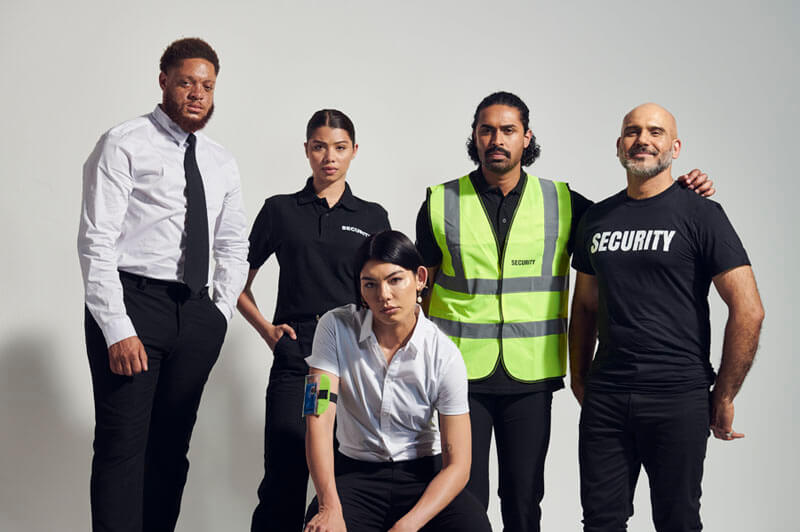
Average Salaries for Security Jobs in 2024: The Ultimate Guide
In today’s world, with rapid technological progress and ever-changing security challenges, there’s a significant need for capable security professionals. Whether you’re thinking about becoming a security guard, door supervisor, close protection officer, or a CCTV operator, knowing the average salaries for these roles in the UK in 2024 is vital. In this guide, we explore the earning possibilities in these various positions, offering valuable insights for those entering or advancing in the field.
Security Guard: Safeguarding the Frontlines
Average Salary:
Security guards, often the first line of defence against physical threats, can expect an average salary ranging from £21,000 to £28,000 per year or £12 per hour in the UK. Salaries may vary based on factors such as experience, location, and the industry in which they operate. Starting salaries for entry-level positions begin at £21,450 per year while most experienced workers make up to £29,036 per year.
Industry Impact:
Those working in high-risk environments or specific sectors, such as retail or event security, may earn higher salaries due to the increased responsibilities and potential risks associated with their roles.
Roles you can get with Security Guard Licence:
- Manned Guarding
- Patrol Officer
- Key-Holder
- Site Security Guard
- Retail Security Officer
- Building Reception
- Store Detective
- and more
Door Supervisor: Maintaining Order with Authority
Average Salary:
Door supervisors, responsible for maintaining order and security in venues, typically earn an average salary for door supervisor jobs ranging from £22,000 to £30,000 per year or £12 per hour. These roles typically begin with an annual salary of £21,685, while individuals with extensive experience in the field may earn up to £30,301 per year.
What qualifications do you need to be a Door Supervisor:
To start working as a Door Supervisor you need to complete the Level 2 award for working as a Door Supervisor in the Private Security Industry course and then apply for your front line licence which is issued by the Security Industry Authority (SIA).
Roles you can get with Door Supervisor Licence:
- Door Supervisor for nightclubs, bars and restaurants
- Event Security
- Corporate Security Officer
- Retail Security
- Loss Prevention Officer
- And more!
Close Protection Officer: Guardian of Personal Security
Average Salary:
Close protection officers, responsible for ensuring the safety of individuals, especially high-profile clients, can earn higher salaries. In the UK, the average salary for close protection officer jobs ranges from £30,000 to £60,000 annually or £26.67 hourly. Entry level positions start at £37,538 per year while most experienced workers make up to £58,500 per year.
Specialised Training:
Close protection officers with specialised training, such as first aid, defensive driving, or advanced threat assessment, may earn higher salaries.
Roles you can get with a CPO Licence:
- Bodyguarding for VIPs and celebrities
- Protection for high-net-worth individuals
- Private international assignments
- Asset protection for high-end retailers
- Residential security

CCTV Operator: Surveillance in the Digital Age
Average Salary:
As technology plays an increasingly vital role in security, CCTV operators are essential for monitoring and ensuring the safety of premises. Completing the CCTV Operator course provides opportunities for employment in CCTV control rooms across various sectors, including businesses, shopping malls, airports, and local councils. In the UK, their average salary ranges from £20,000 to £30,000 per year or £12.26 per hour. Entry level positions start at £21,450 per year while most experienced workers make up to £30,000 per year.
Technological Expertise:
Those with additional skills in cybersecurity, or knowledge of advanced surveillance systems may negotiate higher salaries.
Roles you can get with a CCTV Licence
- CCTV Operator working for local council
- CCTV Operator working for retail store
- Mobile CCTV Operator
- CCTV Control Room Operator
- Camera Enforcement Operator
- Event Control Room Operator
- and more!
Factors Influencing Salaries Across Roles
Experience:
Generally, security professionals with more experience earn higher salaries, especially in roles that demand a mix of skills and practical knowledge.
Location:
Salaries can vary significantly based on the geographical location of the job. Jobs in metropolitan areas or places with higher living costs often provide more competitive compensation.
Industry Specifics:
Security professionals working in industries with high security risks, such as transportation, finance, or critical infrastructure, may get higher salaries due to the increased responsibilities linked with these sectors.
Additional Certifications:
Having relevant certifications, such as those issued by the SIA, can positively impact salary negotiations.
Strategies for Salary Growth Across Security Roles
Continuous Learning:
Adopting a mindset of continuous learning by attending workshops, earning certifications, and staying informed about industry trends can help security professionals for career advancement and higher salaries.
Professional Development:
Actively looking for opportunities for professional development, whether through workshops, seminars, or industry conferences, shows commitment to growth and can positively impact salary negotiations.
Networking:
Building a strong professional network within the security industry can provide access to valuable opportunities, mentorship, and insights into high-paying roles.
Performance Recognition:
Going above and beyond in job responsibilities and consistently showing commitment to excellence can lead to recognition and result in salary adjustments.
Negotiation Skills:
Developing strong negotiation skills is important when discussing salary expectations or seeking opportunities for advancement. Being prepared to show one’s value and contributions can impact the outcome of salary negotiations.
Conclusion
It’s clear that the field offers different jobs with different salary structures. Whether you’re a security guard on the frontline, a door supervisor keeping places safe, a close protection officer guarding people, or a CCTV operator watching digital cameras, the security industry is dynamic and rewarding.
Becoming a security professional requires specialised training to navigate the complexities of the field effectively. Get Licensed stands out as a premier provider, offering top-notch training programs. The door supervisor training prepares individuals to handle diverse situations with professionalism and tact, while security guard training equips them to safeguard various environments. Close protection training focuses on the specialised skills needed to protect individuals in high-risk scenarios, and CCTV operator training provides expertise in the use of surveillance technology to maintain security.
The UK’s number 1 course finder
Best price guarantee
We offer price match if you find the same course cheaper elsewhere
100% money back guarantee
Get a full refund if you don’t like the course. Terms apply.
5-star customer support
Consistently rated 5-stars on review sites like Trustpilot
£0 booking fee
We never charge any booking or hidden fees
Instant eLearning access
Get FREE access to eLearning course materials instantly after you book
Top-rated training providers
Over 90% of our customers pass the exam in the first attempt

 Trustpilot
Trustpilot









